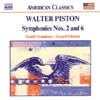Piston Symphonies Nos 2 and 6
Beauty through practicality, intensity through restraint: this is classic Piston
View record and artist detailsRecord and Artist Details
Composer or Director: Walter (Hamor) Piston
Genre:
Orchestral
Label: American Classics
Magazine Review Date: 1/2004
Media Format: CD or Download
Media Runtime: 51
Mastering:
Stereo
DDD
Catalogue Number: 8 559161

Tracks:
| Composition | Artist Credit |
|---|---|
| Symphony No. 2 |
Walter (Hamor) Piston, Composer
Gerard Schwarz, Conductor Seattle Symphony Orchestra Walter (Hamor) Piston, Composer |
| Symphony No. 6 |
Walter (Hamor) Piston, Composer
Gerard Schwarz, Conductor Seattle Symphony Orchestra Walter (Hamor) Piston, Composer |
Author: Peter Dickinson
Piston’s eight symphonies – all but the Third available on CD – are an important part of the 20th-century symphonic canon and are too rarely heard in live performances. So the two recorded here are an asset to the unstoppable Naxos American Classics series.
Piston first trained as a painter then he spent three years as a bandsman in the US army during the First World War. It was here that he learnt about instruments and played several: his orchestration textbook is still standard fare for students. When he came back from the war he went to Harvard and found his metier there, where he spent the whole of his teaching career after returning from two years under Nadia Boulanger in Paris.
Like many of her students Piston was put through counterpoint exercises and a detailed study of Bach. Voice-leading and regular rhythms became the bedrocks of his polished neo-classical style, but he also had a special feeling for melodic intensity, whether it’s the finely spun long lines at the start of the wartime Second or the intense slow movements of both symphonies. The cumulative build-up in the Adagio of the Second is truly impressive in this performance, where Piston’s characteristic restraint never lacks passion. The finale, which kicks off with percussive string chords, is scintillating.
Piston wrote the Sixth 12 years later for the Boston Symphony, an orchestra he knew well and had conducted as a young man in his own early works. Later he justifiably claimed: ‘I was writing for a good symphony orchestra music that I knew would be playable and it was’. The opening is sombre but there are soon pretty colours with two harps supporting woodwind solos. The rapid scherzo has tricky string repartee neatly delivered by the Seattle players. Then there’s a soulful Adagio and another jubilant finale, all decently recorded.
Piston first trained as a painter then he spent three years as a bandsman in the US army during the First World War. It was here that he learnt about instruments and played several: his orchestration textbook is still standard fare for students. When he came back from the war he went to Harvard and found his metier there, where he spent the whole of his teaching career after returning from two years under Nadia Boulanger in Paris.
Like many of her students Piston was put through counterpoint exercises and a detailed study of Bach. Voice-leading and regular rhythms became the bedrocks of his polished neo-classical style, but he also had a special feeling for melodic intensity, whether it’s the finely spun long lines at the start of the wartime Second or the intense slow movements of both symphonies. The cumulative build-up in the Adagio of the Second is truly impressive in this performance, where Piston’s characteristic restraint never lacks passion. The finale, which kicks off with percussive string chords, is scintillating.
Piston wrote the Sixth 12 years later for the Boston Symphony, an orchestra he knew well and had conducted as a young man in his own early works. Later he justifiably claimed: ‘I was writing for a good symphony orchestra music that I knew would be playable and it was’. The opening is sombre but there are soon pretty colours with two harps supporting woodwind solos. The rapid scherzo has tricky string repartee neatly delivered by the Seattle players. Then there’s a soulful Adagio and another jubilant finale, all decently recorded.
Discover the world's largest classical music catalogue with Presto Music.

Gramophone Digital Club
- Digital Edition
- Digital Archive
- Reviews Database
- Full website access
From £8.75 / month
Subscribe
Gramophone Full Club
- Print Edition
- Digital Edition
- Digital Archive
- Reviews Database
- Full website access
From £11.00 / month
Subscribe
If you are a library, university or other organisation that would be interested in an institutional subscription to Gramophone please click here for further information.




